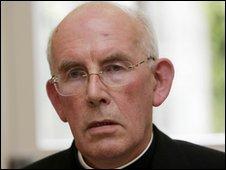Sean Brady's defence for not acting on abuse is risible

It is just not believable that the purpose of the oath taken by two boys in 1975 was other than to cover up abuse.
Yesterday morning the Catholic Communications Office issued a statement “to clarify media reporting on Cardinal Seán Brady”. The statement said that in late March 1975, Seán Brady was asked by his bishop, Francis McKiernan, to conduct a canonical inquiry into an allegation of child sexual abuse made by a boy in Dundalk and concerning Brendan Smyth.
Video: Click here to watch 'Tonight with Vincent Browne' programme on Sean Brady revelations
On March 29th, 1975, Seán Brady and two other priests interviewed a boy (14) in Dundalk. Seán Brady’s role was to take notes. On April 4th that year, Seán Brady interviewed a second boy (15) in the Parochial House in Ballyjamesduff. On this occasion Brady conducted the inquiry by himself and took notes.
At the end of both interviews, the boys were asked to confirm by oath the truthfulness of their statements and that they would preserve the confidentiality of the interview process.
The statement said: “The intention of this oath was to avoid potential collusion in the gathering of the inquiry’s evidence and to ensure that the process was robust enough to withstand challenge by the perpetrator, Fr Brendan Smyth.”
A week later, according to the statement, Brady passed his findings to his bishop, Francis McKiernan, for the latter’s immediate action. Eight days later, on April 12th, 1975, McKiernan reported Brady’s findings to Smyth’s religious superior, the Abbot of Kilnacrott.
Specific responsibility for the supervision of Smyth’s activities was, at all times, with his religious superiors. McKiernan withdrew Smyth’s priestly faculties and advised psychiatric intervention. End of statement.
So according to this, we are told for the first time that it was Brady himself who conducted the “canonical inquiry”. He was not just a humble notetaker, an idea that was conveyed by himself at the weekend, and that raises a separate issue. In the course of this “canonical inquiry” he administered an oath to two boys, aged 14 and 15, involving a promise of secrecy.
That anybody would require abused children to take an oath in the context of the further trauma they must have endured in talking about their abuse, is, on its own, outrageous.
Clearly their parents were not present – you can be certain we would have been told that if they had been. The claim that the oath of secrecy was to “avoid potential collusion in the gathering of the inquiry’s evidence” is palpable nonsense. How could there have been collusion? Only the two boys were interviewed. There might be some credibility to the collusion pretext had the oath been administered at the start of the interviews, but the statement clearly states it was administered at the end of the interviews.
So, it is just not believable that the purpose of the oath was other than to cover up the abuse – to deter the boys from talking generally about what had occurred, thereby giving rise to dreaded “scandal” and maybe the intervention of the civic authorities.
Section 17 of the Offences Against the State Act comes into play here, which makes it a criminal offence to administer an oath to “promote, assist or conceal the commission of any crime”.
Brady clearly believed the boys’ account of their abuse and he therefore knew a crime had been committed. According to the statement, he passed his findings to his bishop for the latter’s “immediate action”. It would be interesting to get clarification on precisely what “immediate action” Brady recommended.
However, it seems from the statement that the “immediate action” envisaged was that the head of the Norbertine order would be informed and psychiatric treatment would be suggested. Not that gardaí would be informed.
One way or another, Brady knew a crime had been committed, and he later must have known that the Garda had not been informed. He was therefore guilty, it seems to me, of the common law offence of misprision of felony.
This is defined in paragraph 5.36 of the Murphy report in the following terms: “a person, who knew that a felony had been committed and although not a party to it, concealed it from the authorities, was thereby guilty of misprision of felony”.
His defence that it was not his role to take action on the basis of his own finding that most serious crimes had been perpetrated on two boys by an identified paedophile offender is risible.
It gets worse.
It now emerges that Brady concealed his role in this entire affair even from his fellow bishops, including Diarmuid Martin, during the course of all the controversy about the cover-up of child clerical abuse. He did this either because he believed what he did was of no consequence at all and therefore not worthy of mentioning, or because he just did not want them to know for some reason.
Either way, it is terribly damning.
My avoidance of titles is not intended to convey any disrespect to Seán Brady or any of the other clerics mentioned here, for I do so because of a belief that titles are one of the instruments of domination and subjugation and should be avoided in every instance, except in formal settings such as courts and parliaments
